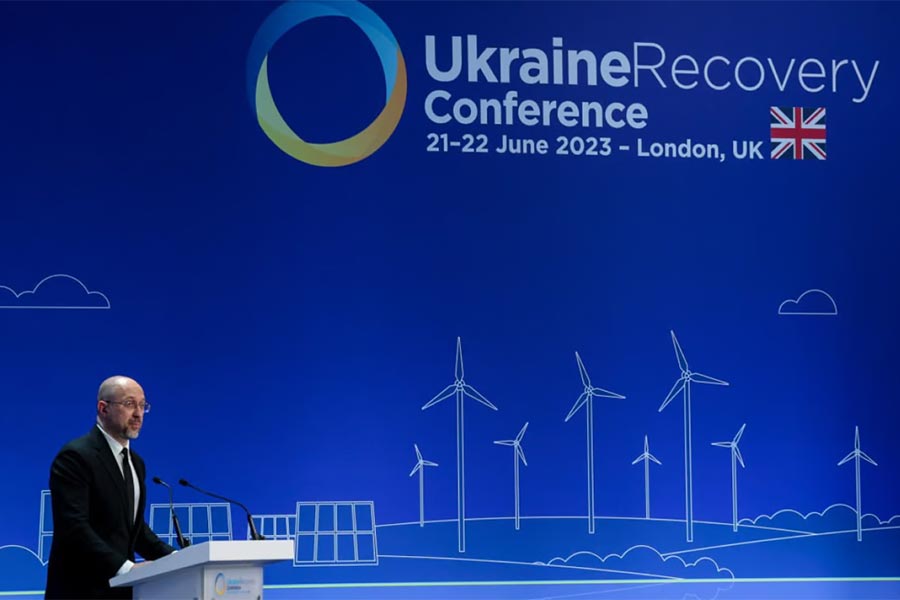International businesses have shown they are ready to invest in Ukraine now, but they also need guidance, and the right course to attract investments is by implementing EU standards, argues Anna Ackermann.
Anna Ackermann is the Ukrainian NGO Ecoaction board member and policy analyst at the International Institute for Sustainable Development (IISD).
Ukraine is a war-torn country whose reconstruction must deliver a sustainable, energy-efficient economy as part of a total transformation. This is a challenging and crucially important project for the country and the EU to deliver.
The recent Ukraine Recovery Conference in London helped catalyse action with financial commitments from national governments, the EU and international companies. This support, and more, is desperately needed if our citizens are to live peacefully and if Ukraine is to develop as a strong and modern economy.
With international backing, reconstruction has the potential to make Ukraine more resilient and, as President Volodymyr Zelenskyy told the conference’s participants, become ‘an engine for green world growth and security.
Over 400 global organisations, eager to boost investment and lay the foundations for Ukraine’s recovery, made pledges in London. Additional funding of $1.3 billion and $3 billion, respectively, from the USA and the UK sat alongside an EU pledge of €50 billion, over four years, through a new financing facility.
On the war’s first anniversary in March, the World Bank estimated a rebuild cost of $411 billion, a figure that will inevitably rise as Russia’s aggression continues. Only the recent Kakhovka Dam destruction will add a few more billion USD to the sum. So, whilst the pledged funding is only a fraction of the total needed for reconstruction, it is a step in the right direction.
The dream of building back better
As European Commission President, Ursula von der Leyen, told delegates, “The dream of a cleaner, greener, more modern Ukraine will last. It is our responsibility to help them make it happen.”
This dream and the will of Ukrainians is to build back better. To modernise our entire infrastructure, embracing circularity and cutting-edge technology. International funding should be given on the condition that EU sustainability standards become the benchmark for redevelopment. If we must rebuild a whole city or a neighbourhood, current national building standards are not fit for purpose if we are to achieve EU Green Deal targets and embrace renewable energy and innovative digital solutions.
Through the bitter experience of war, we understand that a decentralised, resilient energy system can help guarantee our future security. This is a chance to sustainably stimulate the economy and develop new manufacturing industries that open export opportunities, benefitting Ukraine, the region and the EU.
There is an enormous amount of work to be done. This needs to start with legislation mandating net zero construction and sustainable procurement policies alongside a raft of other measures. In time, it is possible that we could even overachieve our targets, becoming an inspiration for other countries net-zero strategies.
To guide this process, the rule of law must be respected, transparency is integral, and, crucially, we need to offer support to all communities, whatever stage of development they are at, so they can increase capacity and secure vital reconstruction funding.
The need to support communities
At the London conference on the reconstruction of Ukraine, aside from general discussions on the importance of public participation, no announcements have yet been made on levels of financial support for communities. Details on how they build capacity and plans for training programmes to upskill workers to meet new standards must follow.
Support for communities can take many forms, but integrating new digital systems so Ukrainians can help manage rebuilding projects and communicate with International Financial Institutions will be essential.
Direct interaction, projects planning and implementation between international partners and Ukrainian cities or regions should also become an integral part of reconstruction efforts through the so-called “regional build back better approach, ” as Prime Minister Denys Shmyhal presented.
There are already examples that illustrate the urgency to rebuild and to do this to higher environmental standards. The London conference heard from Yuriy Bova, the mayor of Trostyanets, once home to 20,000 people and situated just 35km from the Russian border. Enemy troops looted and shelled the city, damaging and destroying most of its infrastructure, including the power grid.
Once the Russians left, after 31 days of occupation, there was a desperate need to start the reconstruction to avert a humanitarian crisis. Mayor Bova spoke about restoring the economy, sustainably rebuilding, and of his vision for a ‘European’ Ukraine centred on green policies and standards.
He also mentioned that 60% of damaged facilities were already rebuilt, showing that reconstruction by Ukrainian communities is already in active phase today.
Next steps
International businesses have shown they are ready to invest in Ukraine now, but they also need guidance on national standards. The right course to attract global businesses is implementing EU standards to facilitate production for both the national market and export. We now need the Ukrainian Ministry of Economy and the Ministry for Restoration to agree on national policies to turn this into a reality.
The next staging post will be 2024’s recovery conference in Berlin, where leaders must focus on decentralised projects and empowering communities as part of the rebuild. Inclusion is key, so we need to hear from the vulnerable members of society recovering from the trauma of war alongside civil society organisations ready to support in any way they can.
We have the opportunity for a wholesale green recovery, not just for the industrial and energy sectors but one that adopts a holistic approach encompassing the EU Green Deal and Paris Agreement targets alongside biodiversity protection.
If we achieve this, we’ll have secured a future that all Ukrainians want, and the country and its neighbours in Europe desperately need.
By Anna Ackermann
Source: euractiv.com

